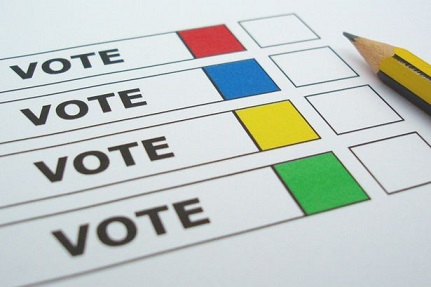
As the electoral battle lines are drawn India braces itself for another general election. This one is costing its exchequer about Rs. 30,000 crores, which is more than what costs America to elect its president. Regardless of who you think is fit to be voted in power or out of it (they say that there is also a NONE OF THE ABOVE choice) we all agree that what we need is good government. What exactly is a good government?
It all begins with training. According to their natural talents people fall in one of the four categories: intellectual, administrative, productive and labor. Each category has its specific duties. Understanding spiritual knowledge and culture is the foremost responsibility of the intellectual class. After that they are also in charge of material sciences and arts like medicine, martial arts, astrology etc. Trained by these intellectuals are the administrative classes who have to provide good administration. The productive or mercantile class has to protect cows and conduct agricultural activities and trade, commerce etc. The labor class assists the other three in the execution of their duties. These are natural divisions and they exist everywhere.
In the Vedic way of life the intellectual class would train the kings to be philosopher-kings. This is called in Sanskrit as rajarsi, raja (king) plus rsi (sage). In today’s democratic setup, there is a lot of emphasis on enforcing laws and ordinances. But the fact remains that this is not sufficient to make the citizens obedient and lawful. Throughout the entire world there are so many states, legislative assemblies and parliaments, but still the citizens are rogues and thieves. Good citizenship, therefore, cannot be enforced; the citizens must be trained. As there are schools and colleges to train students to become chemical engineers, lawyers or specialists in various departments of knowledge, there must be schools and colleges to train students to become intellectuals, administrators, agriculturists and laborers. Similarly there is also the other side which takes care of the spiritual duties of citizens and in that division the population is divided into students, householders, senior citizens and those in the renounced order.
The primary teaching imparted to all these divisions is that there is a Supreme Controller in this universe. In the Bhagavad-gita Lord Krishna is accepted as the Original Person and He is mistakenly thought of as someone who only danced with young girls or stole butter from neighboring households. Lord Krishna personally and through his associates eliminated thousands and millions of antisocial elements, terrorists, dictators etc. He took part in politics, established good government, showed householder’s life etc. Sri Krishna is the root of everything, so all fields of life — politics, sociology, philosophy, religion — can be adjusted once people are trained in the culture of Krishna consciousness.
Food security is one important point in the general elections this year. We have the example of King Prthu who once saw that the earth was not producing enough food grains. He immediately attacked earth and challenged her, “Why are you not producing grains?” Mother earth replied that she has enough seeds to feed the entire population many times over but the whole population has become thieves. And she simply won’t feed rogues and thieves. When Prthu assured her about rectifying the character of his population, mother earth provided ample food grains. This is directly opposite to the present mentality of trying to exploit the earth of her resources and yet shout hoarse about excessive population.
There is an example of how much the citizens loved their king in the following story of Lord Ramacandra and a poor brahmana. One day Laksmana, the younger brother of Lord Rama informed him that in his kingdom lives a poor brahmana who would not eat anything unless he has seen the lotus face of Lord Rama. At that particular time Lord Rama was on tour for many days and hence the brahmana was not able to see him. Still he kept his vow and fasted from food and water for that whole time. Here is a case of the simple citizen being on almost an equal level with that of the ruler. Greatly pleased and happy Lord Rama ordered that His own deity be given to that brahmana so that in His absence he can see the deity and carry on with his daily duties. This specific deity is still being worshiped in South India.
